
|
The
President of the United States of America, authorized by Title 10, Section
8742, U.S.C, awards the Air Force Cross to Senior Airman Dustin H. Temple for
extraordinary heroism in military operations against an armed enemy of the
United States in Helmand Province, Afghanistan from 27 to 29 September 2014. On
these days, while attached to a United States Special Forces team, Airman
Temple displayed extraordinary bravery and complete disregard for his own life
as he and his teammates assaulted an insurgent safe haven.
As
overwhelming hostile fire continually suppressed his team, Airman Temple broke
the assault on many occasions with danger close air support from F-16s, AH-1s,
AC-130s and an MQ-1. Following a
teammate being gravely wounded by a sniper, he put himself directly in the line
of fire, and dragged his wounded teammate from the rooftop. With the evacuation helicopter inbound,
Airman Temple again risked his own life to save his teammate, by carrying him
across one hundred meters of open terrain.
Despite overwhelming and accurate enemy machine gun fire, he remained on
the open landing zone, providing covering fire while his teammates pulled back. After he returned to the compound, enemy
fighters surged within 40 meters after intercepted communications stated, “Take
the Americans alive.” Airman Temple
immediately directed F-16s in danger close strafing runs, killing one insurgent
and repelling the assault. As supplies
dwindled, he braved open terrain again to retrieve critical ammunition from a
resupply helicopter. With continuous
machine gun fire, he and a teammate sprinted into the open and dragged the
supplies off the aircraft; however, unable to carry the entire load, they
withdrew back to cover. Airman Temple
called in danger close fires from F-16s to cover his team as they went out to
retrieve the remaining ammunition.
Despite the continuous machine gun fire, Airman Temple and two teammates
again ran into open terrain to retrieve the remainder of the supplies for a
second time. At the end of the 48-hour
engagement, he controlled 28 attack helicopters and 20 fixed wing assets for a
total of 26 engagements while safely employing munitions at danger close range
75 times. Airman Temple’s heroic and
selfless actions directly resulted in confirmed 10 enemy fighters killed, and
another eight estimated killed, while saving the lives of 38 friendly
forces. Through his extraordinary
heroism, superb Airmanship, and aggressiveness in the face of the enemy, Airman
Temple has reflected the highest credit upon himself and the United States Air
Force.
|
Special Tactics Airmen to receive high medals of valor
|
|
 |
Pope Army Airfield, N.C. -- One U.S.
Air Force Special Tactics Airman from 21st Special Tactics Squadron,
24th Special Operations Wing, will receive the Air Force Cross, and two
Special Tactics Airman, 21 STS, will receive the Silver Star for
courageous actions during a 48-hour battle against nearly 100
insurgents in Afghanistan while embedded with a U.S. Army Special
Forces team, here May 6, 2015.
The
ceremony, officiated by U.S. Air Force Lt. Gen. Bradley A. Heithold,
commander of Air Force Special Operations Command, will take place at
10 a.m. on Pope Army Airfield, and will include special remarks from
U.S. Navy Vice Adm. Sean A. Pybus, deputy commander of Special
Operations Command, and U.S. Army Capt. Evan Lacenski, 7th Group
Special Forces, Special Forces team leader for the three Combat Controllers.
These Special Tactics Combat Controllers are credited with saving the lives of 38 coalition soliders
when ammo was low and nearly 100 insurgents surged to capture the team.
Senior Airman Dustin Temple will receive the Air Force Cross, and Tech.
Sgt. Matthew Greiner and Senior Airman Goodie Goodman will receive the
Silver Star. |
| Temple (pictured above) is one of seven Airmen to
receive the second highest valor award in the global war on terror.
This is the second battle in the last 15 years of U.S. Air Force
history that has resulted in multiple decorations of the highest valor. |
The
Air Force Cross is the highest service-specific medal an Airman can
receive, second only to the Medal of Honor. The Silver Star is the U.S.
military’s third highest military decoration for valor.
An award for valor second only to the Medal of Honor will go to a Fort Bragg airman next week.
Senior
Airman Dustin H. Temple (pictured right) will receive the Air Force Cross for
extraordinary heroism while pitted against enemy fighters in Helmand
province, Afghanistan, in September.
Temple is a member of the 21st Special Tactics Squadron, based at Pope Field.
Two other members of the squadron, all Combat Controllers, also will be honored for the same 48-hour battle.
Tech.
Sgt. Matthew J. Greiner and Senior Airman Goodie Goodman will each
receive the nation's third-highest award for valor, the Silver Star.
According
to officials, it will be only the second time the Air Force will award
multiple Silver Stars and higher for the same event since Sept. 11,
2001. |
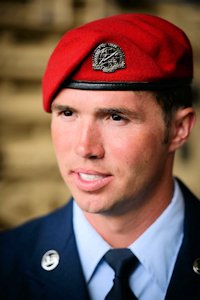 |
An award for valor second only to the Medal of Honor will go to a Fort Bragg airman next week.
Senior Airman Dustin H. Temple will receive the Air Force Cross for
extraordinary heroism while pitted against enemy fighters in Helmand
province, Afghanistan, in September.
Temple is a member of the 21st Special Tactics Squadron, based at Pope Field.
Two other members of the squadron, all Combat Controllers, also will be honored for the same 48-hour battle.
Tech. Sgt. Matthew J. Greiner and Senior Airman Goodie Goodman will
each receive the nation's third-highest award for valor, the Silver
Star.
According to officials, it will be only the second time the Air Force
will award multiple Silver Stars and higher for the same event since
Sept. 11, 2001.
The three medals will be presented by Air Force Lt. Gen. Bradley A.
Heithold, commander of Air Force Special Operations Command, during a
ceremony Wednesday on Pope Field.
Navy Vice Adm. Sean A. Pybus, deputy commander of U.S. Special
Operations Command, and Army Capt. Evan Lacenski, leader of the 7th
Special Forces Group team that all three airmen served with, are
scheduled to speak.
The three airmen are credited with saving the lives of 38 coalition
soldiers who were low on ammunition and under attack by nearly 100
insurgents, according to the 24th Special Operations Wing, the higher
command of the 21st Special Tactics Squadron.
According to medal citations, the men disregarded their own lives to save the members of their team.
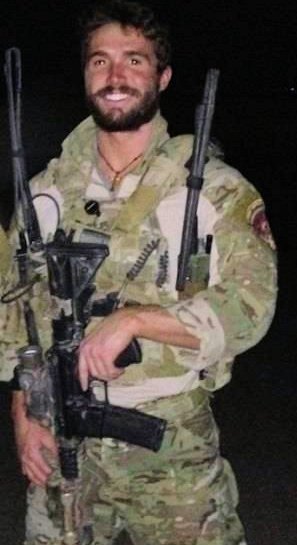 |
Counter assault
Temple
is credited with coordinating a counter assault involving F-16 Fighting
Falcon jets, AH-1 Cobra attack helicopters, AC-130 Spectre gunships and
an MQ-1 Predator unmanned aerial vehicle.
He also risked his
life to save a teammate who was gravely wounded by a sniper, dragging
the wounded man from a rooftop and then carrying him over more than 300
feet of open terrain to reach a medical evacuation helicopter.
Temple
(pictured left) then remained in the open, providing cover for the helicopter, before
returning to the compound where the rest of his team were fighting
advancing insurgents.
According to intercepted communications, the enemy fighters were instructed to "Take the Americans alive."
Temple fought off the assault with air assets.
Then, with supplies dwindling, he again bounded across open terrain to retrieve ammunition from incoming aircraft.
While
Temple fought on one side of the Helmand River Valley, Goodman and
Greiner were in another position with more U.S. troops and Afghan
commandos.
Within minutes of the assault, which started Sept.
27, Greiner had engaged enemy fighters by directing A-10 Warthogs and
AH-64 Apache helicopters.
|
During the battle, Greiner led defensive air strikes, all while
rocket-propelled grenades and machine gun fire erupted from all
directions.
Greiner focused his efforts on halting the enemy advance, calling in
four 500-pound bombs from a pair of F-16s, coordinating Hellfire
missiles and strafing runs from Apaches on motorcycle-riding enemy
fighters and then directed an AC-130 to stop a potential suicide attack.
Rooftop position
At the same time, Goodman also controlled F-16s and Apaches from a
nearby rooftop, where enemy machine gun fire regularly struck a wall
within inches of his head.
Goodman stayed in the position, using it to help repel the assault and subdue enemy snipers.
At one point, he directed the loud AC-130 gunships to fly out of
audible range to draw the enemy out of hiding before bringing the
planes back in to assault them.
Officials said the deployment was the second for Temple, fifth for Greiner and first for Goodman.
Air Force Cross, Silver Stars presented to three Fort Bragg airmen
|
|
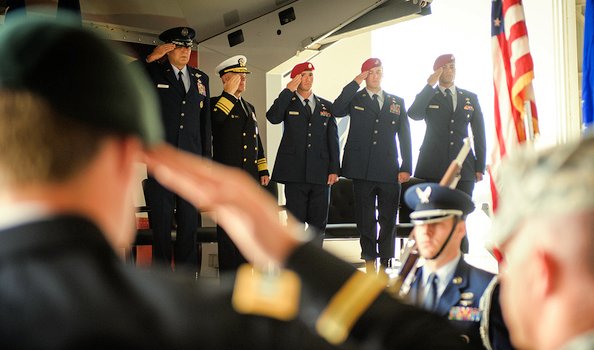 |
Three Fort Bragg airmen received some of the military's highest awards
for valor Wednesday when they were recognized for their efforts during
a 48-hour battle in Afghanistan last fall.
Senior Airman
Dustin H. Temple received the Air Force Cross, his service's highest
award and the nation's second-highest award for valor, below only the
Medal of Honor.
Tech. Sgt. Matthew J. Greiner and Senior Airman Goodie J. Goodman each received the Silver Star.
According
to officials, it was only the second time the Air Force has awarded
multiple Silver Stars and higher for the same event since Sept. 11,
2001.
All three airmen are Combat Controllers with the 21st Special Tactics Squadron based at Fort Bragg's Pope Field.
|
Officials said all three are preparing to deploy again.
On Sept. 27, the airmen were deployed alongside a detachment from the
7th Special Forces Group when they, along with Afghan commandos,
conducted a mission meant to disrupt insurgents in Helmand province.
The
detachment commander, Capt. Evan A. Lacenski, said the troops knew it
would be a difficult fight, but he said what they encountered was the
toughest battle many had ever been in.
Within hours, they found
themselves low on ammo and under attack by nearly 100 enemy fighters,
who according to intercepted communications had planned to take the
troops alive.
Lacenski said he thought that maybe the battle would be their last.
"I think everyone did," he said.
Instead,
the three airmen saved the soldiers and their Afghan counterparts,
going above and beyond the call of duty to coordinate air strikes,
retrieve ammunition and move injured teammates.
Temple (pictured right) is
credited with risking his life to save a Special Forces medic shot in
the head by an enemy sniper. He then dragged the medic, Sgt. 1st Class
Andy Weathers, from a rooftop and carried him across open terrain to
reach a medical evacuation helicopter.
Lacenski said Weathers
later died, but Temple's efforts helped ensure the medic's family was
able to visit him in an Army hospital before he passed.
Throughout
the two-day ordeal, the three airmen coordinated dozens of aircraft. So
many, in fact, that some had to be turned away for lack of space in the
air.
"It was the most hectic and chaotic two days of my life," Lacenski said.
The airmen themselves deflected the praise after receiving their medals.
|
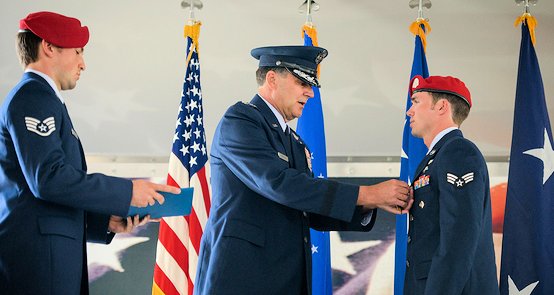 |
They credited their training, which allowed them to stay focused in the chaos.
Vice
Admiral Sean A. Pybus, deputy commander of U.S. Special Operations
Command, called the battle a "case study of toughness, teamwork and
commitment."
"Because of their actions, the coalition team won the fight and lived to fight again," he said.
Pybus was one of two three-star officers who attended the ceremony.
The other, the commander of Air Force Special Operations Command, Lt. Gen. Bradley A. Heithold, presided over the ceremony.
Heithold called it an honor to present the medals.
"Not everyone who serves in this country deserves to be called a hero," Heithold said. "You do."
And he thanked Lacenski for pushing to have the three honored.
The
special operations community is hesitant to tout its own success,
Heithold said. And the recognition is more special when it comes from
outside.
"It feels really good when your joint partners trumpet your successes," he said.
|
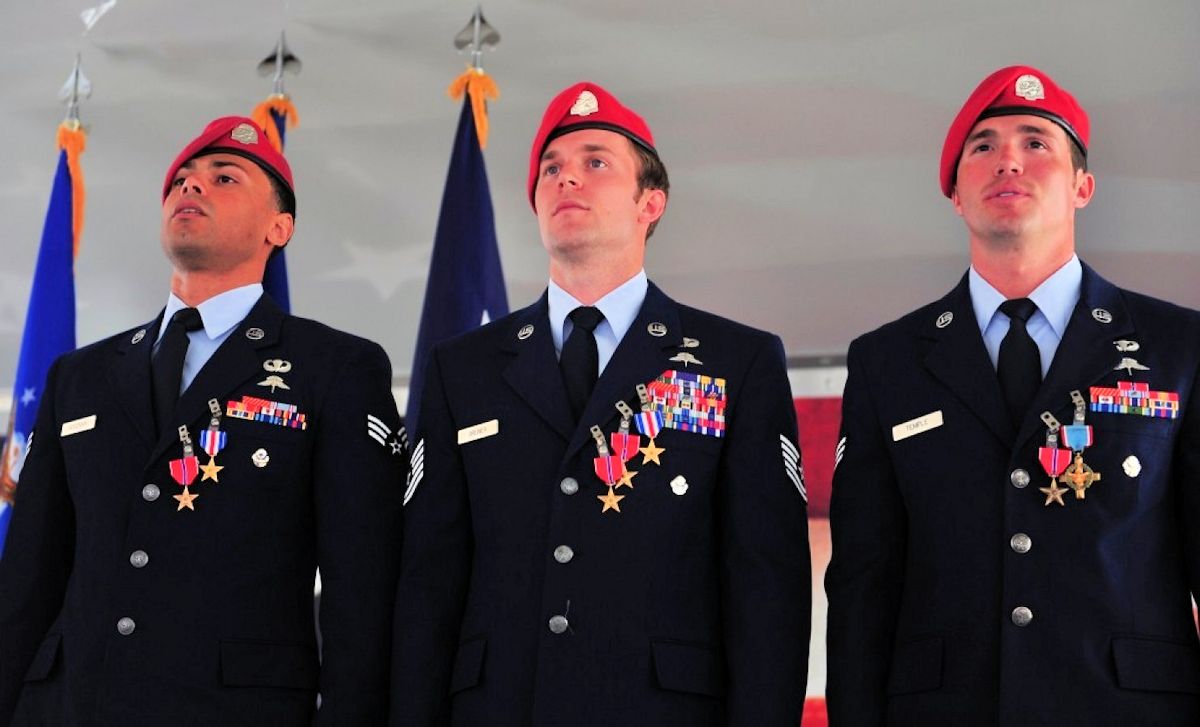
Above; Senior Airman Goodie J. Goodman, left, Tech.
Sgt. Matthew J. Greiner and Senior Airman Dustin Temple stand after
their new valor awards were distributed on Wednesday at Pope Army
Airfield in North Carolina. Temple received the rare Air Force Cross,
while Greiner and Goodman received Silver Stars for their roles in
fighting off a brutal ambush in Afghanistan in September 2014.
He saved 80 lives: Why not the Medal of Honor?
|
The
Air Force is the only service that does not have a Medal of Honor in
the Global War on Terror, and with another airman's heroic action in
battle resulting in an Air Force Cross, experts are again asking: What
does an airman have to do?
Senior Airman Dustin
Temple, a Combat Controller with the 21st Special Tactics Squadron at
Pope Field, North Carolina, showed extraordinary heroism in a September
battle, repeatedly exposing himself to enemy fire to recover an injured
soldier and resupply his team. He is the seventh airman to receive the
Air Force Cross, the second-highest valor award, since 2001.
"Airman Temple's
heroic and selfless actions directly resulted in confirmed 10 enemy
fighters killed, and another eight estimated killed, while saving the
lives of more than 80 friendly forces," his Air Force Cross citation
states. "Through his extraordinary heroism, superb airmanship and
aggressiveness in the face of the enemy, Airman Temple has reflected
the highest credit upon himself and the United States Air Force."
Temple was originally
nominated for the Silver Star, Air Force Special Operations Command
spokeswoman 1st Lt. Katrina Cheesman said.
Air Force spokesman
Lt. Col. Pete Hughes, speaking on behalf of other Air Force officials,
said that Temple was still up for a Silver Star when his nomination
landed before the three-person decorations board that met in
mid-January. That board also considered the award nominations for Tech.
Sgt. Matthew Greiner and Senior Airman Goodie Goodman, who also
received Silver Stars for their bravery in the same September battle
Temple fought in.
Hughes said that the
board quickly decided all three airmen's heroism deserved recognition.
But Temple's actions stood out as particularly remarkable, he said, and
the board decided to recommend to Air Force Secretary Deborah Lee James
that he receive the Air Force Cross.
The Air Force would not say whether the board considered recommending Temple for the Medal of Honor.
Defense Department
spokesman Navy Lt. Cmdr. Nate Christensen said the Office of the
Secretary of Defense did not receive a recommendation from James
regarding a possible Medal of Honor for Temple.
Army Capt. Evan
Lacenski, the leader on the mission and 7th Group Special Forces team
leader, put Temple in for an award, and the determination was up to the
Air Force. Lacenski said Temple needed to be recognized "like the
American hero" he is.
"His citation is
solid," said Doug Sterner, curator of the Military Times Hall of Valor
and an expert on military awards who has testified before Congress on
the topic. "He put himself in front of his buddy, dragged him across an
open space. What does it take to get a Medal of Honor?"
The Air Force awarded
four Medals of Honor for Korea, all to pilots, and 14 for the Vietnam
War, all but three to pilots. There are only three living Air Force
Medal of Honor recipients, with none for the current generation,
Sterner said.
"Where is the Air
Force Medal of Honor recipient for the next generation?" Sterner said.
"I don't know why the Air Force isn't advocating for it."
The Air Force's strongest case for a Medal of Honor came in 2011, when then-Staff Sgt. Robert Gutierrez was awarded the Air Force Cross for a 2009
battle in Afghanistan, Sterner said. Gutierrez, also a Combat
Controller, was deployed with a Special Forces team to target a Taliban
commander in Afghanistan's Herat Province. The team infiltrated a
village and came under fire from insurgents. Gutierrez covered for a
soldier whose gun jammed, when a shooter on a rooftop shot Gutierrez in
the left shoulder. Gutierrez fired back, killing the insurgent.
Gutierrez dropped to
the ground, and tried to call for a medic but couldn't breathe because
his lung had collapsed from the shot. A medic jammed a syringe in his
chest to relieve pressure. While this happened, Gutierrez reached for
his radio and called for airstrikes from nearby F-16s and directed
danger-close air support from A-10s, before calling for his own
evacuation helicopter.
When Gutierrez
received the Air Force Cross, many in the Combat Control community
asked why he wasn't considered for the highest valor award.
"I just think he did
the job the medal was written for," Gene Adcock, president of the
Combat Control School Heritage Foundation, said at the time.
But Sterner is unconvinced.
"What does any airman
have to do?" he said. "There has not been an Air Force Medal of Honor
for any action since the Vietnam War. It makes you really wonder what
is going on within the Air Force."
 |
|